DAY 1
Morning
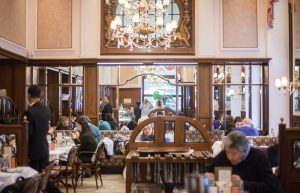
Start your day right and in a true Viennese fashion with a good coffee in one of the city’s many traditional coffeehouses. The setting will make you feel like you’re travelling back in time – the waiters dress up in tuxedos and the cakes invite you to forget any diet you were dedicated to when you walked in. Whether you choose to breakfast at one of the most famous cafes – like Café Central (https://www.cafecentral.wien/en/), or Demel (https://www.demel.com/en/) – or you prefer the lesser known, hidden ones – like Café Jelinek (http://cafejelinek.steman.at) or Goldegg (http://www.cafegoldegg.at) – make sure you find time to start your day off slowly in here, blend in with the mixed crowd, while spotting the typical Viennese dialect and sipping on the local’s coffee of choice, the Melange.
Lunch
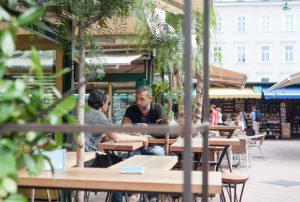
It’s time to get personal with the people of Vienna and one of the best places to do this is the Naschmarkt (open Mon-Sat). On Saturdays, you’ll find a big flea market happening here where locals sell off antiques or vintage wares, often with a smile and a story to share. Spending time rummaging through the stuff at this market will give you a great glimpse into the lives of Vienna’s inhabitants. Also be sure to stroll through the permanent market, which is lined with funky cafes and restaurants, and stands selling all kinds of tasty treats, from fresh produce to baked goods, and other Turkish, Oriental, Italian and Austrian specialties.
Afternoon
Even if you’re not looking for it, you’ll find Vienna is busting with art! Whether you are into the classic painters from the Renaissance, or the modern era of Art Nouveau, you will surely find something to excite your eyes, and your heart, in this culturally rich city.
The Albertina Museum hosts some of the greatest artist’s works of all times, with permanent collections featuring the likes of Albrecht Dürer, Monet and Picasso, just to name a few. Another great gallery for those who love contemporary art is the Leopold museum in the Museumsquartier – this gallery hosts a vast collection of Vienna’s art celebrities, including Gustav Klimt and Egon Schiele. In the Museumsquartier, you’ll also find the Mumok, which has changing exhibitions of contemporary art throughout the year.
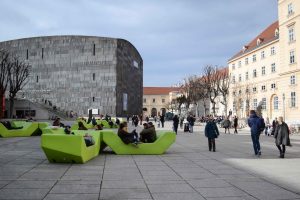
The museums of the so-called ‘MQ’ not only showcase the best exhibitions in the city, but they also boast unique cafés around the complex (which used to be the Emperor’s horse stables).
Evening
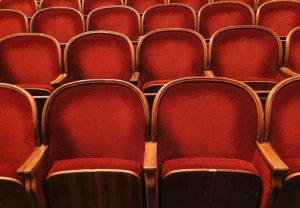
If you’re in Vienna and your time is limited, you might want to try and catch some classical music, or a night at the Opera. The best place to do this is, of course, the Staatsoper (State Opera House). It’s not only the highest-ranked music institution in Austria, but it’s also known for showcasing some of the best opera in the world. With shows on almost every night (except during the summer break), you should have no problem finding tickets, even on the same day of the performance. If the show seems to be sold out, it’s still worth queuing up at the venue on the night of the performance to try and get some standing tickets (that go for a very good price). The interior of this place is amazing.
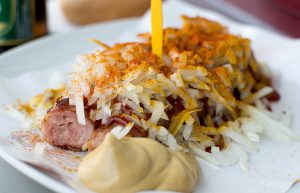
If there was no time for dinner between all the cultural happenings, do what a local would do – grab a bite to eat at one of the Würstelstande (sausage stands) you see all over town, where you can get a typical Käsekrainer (the bveloved cheese-filled sausage invented in Vienna), and a beer in a can and chat to the owner of the stand about the latest word on the street.
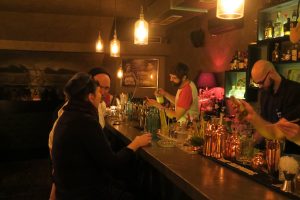
Later into the night, you can discover some of Vienna’s famous cocktail bars, either classic American ones, like Roberto’s (http://www.robertosbar.com), or more unconventional ones like Krypt (http://www.krypt.bar) or Botanical Garden (http://www.botanicalgarden.at/de/home). If you’re happy to squeeze in with a smoking crowd, you can also check out the Loos Bar (https://www.loosbar.at) in the 1. District – a tiny, yet legendary cocktail bar designed in 1908 by Vienna’s star architect, Alfred Loos.
DAY 2
Morning
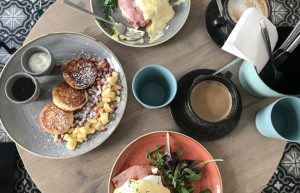
The Viennese love a long brunch and countless locations around the city offer great all-day-breakfasts, or lavish all-you-can-eat buffets to cater to this. The trick here is to be sure to reserve in advance, especially on the weekend. Some of the best spots for long breakfasts include Motto am Fluss (https://www.mottoamfluss.at/en/welcome/), Café Telegraph (https://www.facebook.com/CafeTelegraph.at/), or Restaurant Mill (http://www.mill32.at).
Lunch
The time has come to step outside the city center and head to the wine hills. After a long hike on very clearly marked paths, look for those cosy and authentic Heuriger – traditional taverns specialized in wine and locally produced gourmet snacks. The best area to discover the Heuriger culture is the 19th district, in the area called Grinzing, which is also inviting for nice walks in the wine hills when the weather allows it.
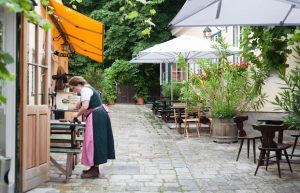
Most of the taverns found here are family-run businesses where the owners will often be the ones doing the serving, and taking great pride in the products they are serving up. All wine at a Heuriger is produced by the same people serving you up your food and drinks.
Afternoon/Evening
Vienna is full of gorgeous architecture and beautiful parks, impressive palaces and neatly manicured gardens. The best way to explore the landmark buildings and the city’s green spots is by bike. The city has endless bicycle lanes, many of which pass the most scenic sights in the city center. Rent a bike and discover Vienna at dusk by riding around the Ring. Start your ride at the Hofburg, pass the Parliament, the City Hall, the University and then head onto the Danube canal, before coming back to the ring, passing Stadtpark and finishing at the State Opera House. This bike tour is a great way to check out the most important historical and cultural buildings in town, in just a couple of hours. If you don’t feel like riding a bike, that’s perfectly fine, as the mentioned tour can easily be covered by tram, or on one of the many e-scooters you can rent around town.
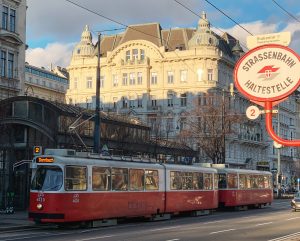
Last, but not least
If all that sightseeing made you hungry, be sure not to leave Vienna without having tried the famous Schnitzel. While the typical Viennese Schnitzel is made out of veal, many prefer the pork variant, available at all restaurants serving Austrian specialties.
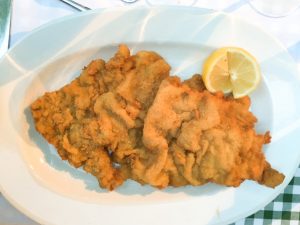
While there are many restaurants who claim to make the best Schnitzel, the good news is that it’s quite difficult to go wrong with this golden, bread-crumbed covered meaty favourite. However, if you want to impress friends back home with a picture of a Schnitzel bigger than your plate, visit the famous restaurant, Figlmüller (https://figlmueller.at/en/).
Add comment